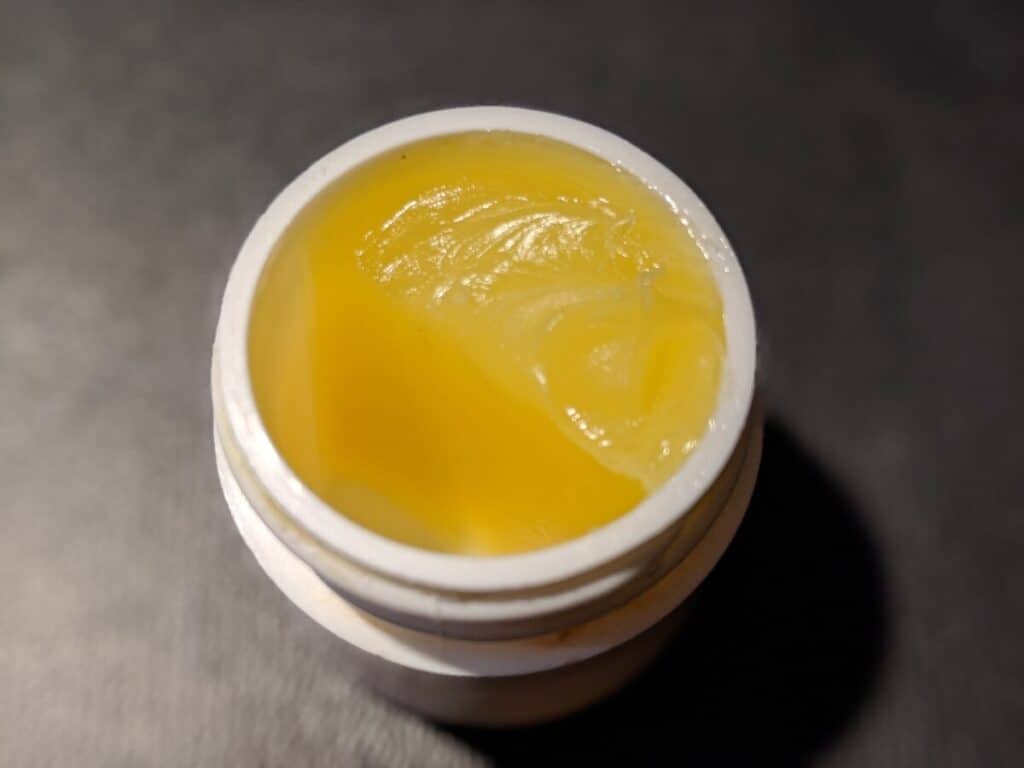This post contains affiliate links. We earn commissions if you purchase products from retailers after clicking on a link from our site. As an Amazon Associate, we earn from qualifying purchases.
Have you ever wondered what that slimy stuff was made of that you use to grease your brass instrument slides? Well… me too! I decided to research the topic and find out what that gunk is made of.

By the way, looking for recording equipment and musical instruments? Check out Sweetwater.com for microphones, monitors, audio interface or any other recording gear that you could ever need. (Affiliate Link)
Tuning slide grease is either made of an organic grease which is composed of a base oil (such as anhydrous lanolin) and a thickener (typically a soap), or a synthetic grease composed of a synthetic base such as a refined petroleum product with a thickener.
Is that it? What’s the difference? Why would you want an organic grease or a synthetic grease?
I didn’t know very much about this subject so I decided to call an expert: Ken Saul, who leads manufacturing for Ultra-Pure Oils, a company that specializes in brass instrument lubrication. Let’s dive in and see what we’ve found.
So… What Is Slide Grease Made Of?
So, it really helped me to find out what the definition of a grease was before I got started. A grease is actually just a thickened lubricant (you can read more on Wikipedia).
For organic slide greases, a base lubricant oil is combined–in a special process called emulsifying–with a thickening compound that is often classified as a soap (although it’s not the kind of soap you’d necessarily wash your hands with).
Here are a few examples of a base lubricant oil for organic greases:
- Anhydrous Lanolin (gathered from sheep wool)
- Petroleum (crude oil which comes from ancient plants and dinosaurs)
Now, as for synthetic greases, I got some help from Ken Saul on this one, I learned that “synthetic” greases can come from organic sources, such as petroleum, or come from a byproduct in petroleum processing. In any case, the result will be highly refined. Ken gave palm oil as an example of a potential type of synthetic grease base.
In essence, the “synthetic” term doesn’t mean that it was made in the laboratory, necessarily, but simply that it’s processed. This extra processing and refining gives the grease some highly sought-after characteristics.
Why Use Synthetic Or Organic Slide Grease?
Ultimately, whatever slide grease you use on your instrument is up to your personal preference, but there are some differences to consider.
Organic slide greases, such as those that come from sheep wool (Lanolin) are often mixed with petroleum jelly (which is often sold as Vaseline in the U.S.). Some trumpet players swear by these blends or by lanolin, alone.
What do the experts say?
Synthetic slide grease has a tremendous advantage due to its stability. What do I mean by that?
- Petroleum jelly has a melting point between 158 to 176 degrees Fahrenheit (source)
- Lanolin has a melting point between 100 and 104 degrees Fahrenheit (source)
I don’t have the numbers for melting points for synthetic oil grease, but one manufacturer of tuning slide grease (fat cat oil), claims that their synthetic tuning slide grease can’t be melted on a stove.
It’s not exactly apples to apples, but synthetic greases for cars withstand temperatures above 500 degrees Fahrenheit before “dropping” to liquid form.
What’s also nice about synthetic valve greases is that they are also more stable in cold. As organic slide greases will become harder to operate in colder weather.
In short, synthetic tuning slide grease won’t soften as easily at high temperatures, and will stay closer to the same consistency in colder temperatures.
What’s Wrong With Melting Slide Grease?
You might be wondering… so what? What’s the big deal if your slide grease melts?
The biggest concern is that melting slide grease can migrate to your valves. although lanolin, petroleum jelly and synthetic greases are all water insoluble, brass players still have to eat food, and occasionally the time between pizza and performance is not as much as the brass player might hope.
Furthermore, if you are playing a valved brass instrument, your valve oil is often also made with petroleum products/byproducts and these can actually break down your slide grease. Since lanolin and other low-melting temperature greases are so much softer at colder temperatures, they have a higher likelihood of migrating to your valves.
The worst that may happen is that your valves would get gummed up and you would have to clean them. Not the end of the world, but definitely desirable to avoid if possible.
The Case For Organic Slide Grease
All that being said, there are still some diehards that swear by lanolin valve grease.
Sometimes it’s the thickness of the grease, sometimes its how it responds after playing, etc.
Again, it really comes up to your own personal preference, but remember that whether it’s synthetic or organic based isn’t what impacts how thick the slide grease is, as its the thickener that causes grease to be… well… greasy.
For example, ultra-pure oils sell synthetic tuning slide greases that are lightweight or heavy depending on your needs and if your instrument has loose slides (heavy grease needed) or if you want to have extremely easy to move tuning slides (light grease needed). The base synthetic oil is the same, but the thickener blend is different.
What Can I Use Instead Of Commercial Slide Grease?
It’s definitely important to use something and use something that won’t corrode the tuning slides. Not using anything actually leaves the slides unprotected and will cause the slides to seize up and corrode (especially if left exposed).
So, if you don’t have a tub of slide grease, there are some easy replacements that will work fine:
- Vaseline (petroleum jelly). This thickness of this will not be awesome all by itself but it’s safe to use on your instrument. Some players have used Vaseline exclusively for years. It’s not going to smell great, but it does work.
- Lanolin. If you know a mom who nursed her children there’s a really good chance she will have some since lanolin is commonly used as a lotion. Unscented is the best because you want as little contaminants in the instrument as possible.
It’s ironic that the things you might have around your house to lube your brass instrument are the same compounds that many slide greases combine and sell to you.
That being said, slide grease is very inexpensive and lasts a long time, it’s worth using some so you don’t have to find the perfect blend as they have already done that for you.
Can I Use Valve Oil Instead Of Slide Grease?
One other point I wanted to bring up on the subject of talking about slide grease and possible alternatives: Can you use valve oil instead of slide grease?
The main difference between slide grease and valve oil is viscosity. Or, the thickness of the oil.
Thickness of oil is important, however, especially when we are talking about brass instruments. Although it’s easy to reach for the valve oil (and this may work perfectly well for your exact needs), one problem with this approach is longevity.
If you are playing consistently, you may even want to re-grease your tuning slides every week. With valve oil, you would need to reapply a lot more because it’s not intended to stick around as long (no pun intended… but we’ll roll with it!)
So that’s one strike–another strike is that part of the benefit of slide grease is that it creates a smooth seal. Slides are essentially two cylinders made to fit inside one another very tightly. Even with the best-designed trumpet, these cylinders need a grease to stop up all the gaps between the cylinders.
Furthermore, slide grease leaves a film that protects your slides since they are constantly being opened up to air which can cause them to corrode over time.
So, if you don’t have any slide grease and you need your slides to be really loose, then valve oil *might* work in a pinch–although you may need to re-apply frequently throughout a performance.
But in short, you want to use valve grease over valve oil because it protects, seals, and lasts longer.
Is Slide Grease Toxic?
This is a great question… and I looked up some of the prime suspects to check their toxicity:
- Vaseline: petroleum jelly is classified as mildly toxic or sometimes as nontoxic (source) and can make you sick if you ingest it in large amounts. The amount floating around in your brass instrument is therefore unlikely to ever be an issue
- Lanolin: Lanolin is considered as mildly toxic and should not be ingested especially in larger amounts because of its tendency to accumulate.
- Mineral oils: Petroleum derivatives are considered toxic if unrefined, while highly refined mineral oils are not classified as toxic (source— but not clarified as completely safe, either)–but the point of synthetic valve greases is to be as highly refined as possible.
My takeaway from this is that no matter what you are using to grease your tuning slides, you should avoid eating the extra left behind–but trace amounts are not likely dangerous.
Closing Remarks And Storytime
I really appreciated Ken Saul’s time. I couldn’t help but share an awesome story that he shared with me that speaks to the variety of synthetic slide greases in particular.
This conversation happened during this time in the world where everybody is wearing masks. Ken was playing a gig and he was using thin oil so he could move his tuning slides as fast as possible.
Because of this, his 3rd valve tuning slide was exceptionally loose and free to move, which is fine if you keep a hand on it. The problem was that one song called for a plunger mute which requires the player to hold the trumpet with the right hand. So the 3rd-valve essentially was getting ready to fly out of the trumpet.
Fortunately, Ken thought of using the elastics on his mask to wrap up the 3rd valve so it could stay closed while playing.
And that proves that you can make a good thing out of a rough time.
